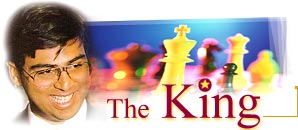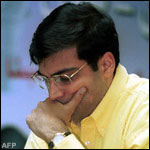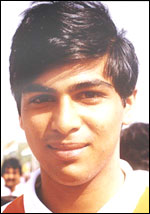
Opening Gambit
Not meaning to spoil things for anyone, mind -- but the fact remains that
India has no world champion by the name of Vishwanathan Anand.
But yes, India does possess -- and takes great pride in -- a certain Anand
Vishwanathan, newly-crowned world champion in the game of 64 squares.
Vishwanathan is the father, Anand the son. The mixup occured once he began
going abroad. 'Anand V' became, thanks to the bureaucratic policy of putting
the initial first, 'V Anand', on his passport and other documents. And when
that was expanded, it became Vishwanathan Anand -- duly shortened to Vishy.
Initially, Anand took some trouble to point out the error. But along the
way, he came to like the name 'Vishy', figured that carrying his father's
name was a matter of pride, and let the name stick.
For the record, Anand was born on December 11, 1969, to Vishwanathan, who
retired as General Manager, Southern Railways, and Susheela, housewife and
chess afficionado. It was the latter who, when Anand was five, initiated him
into the mysteries of the game, and oversaw his early development. At the
time, Chennai (Madras, as it was then called) had a flourishing chess
culture, thanks to the presence of Manuel Aaron, India's first ever
international master, and Ravi Kumar, India's second IM.
The hallmark of great achievers, in any field, is that they build up a
legend of their own. There is, thus, the story of Sunil Gavaskar learning
cricket in a narrow gully, and honing his ability to play with a straight
bat because the slightest deviation from that practise could bring with it a
broken window, and inevitable chastisement. Or the story of the young Sachin
Tendulkar batting in the nets with a one rupee coin placed on his stumps, as
reward for any bowler who could knock it off. Sachin, we are told, became
the neighbourhood plutocrat by default, pouching the coins after defending
his stumps against all comers.
 And so, too, with Anand -- the construction of his legend began while he was
still very young. In Madras, the haunt of choice for chess afficionadoes is
the Mikhal Tal Chess Club, which thanks to the benevolence of the Russian
embassy, provided chess sets and other equipment to young aspirants.
And so, too, with Anand -- the construction of his legend began while he was
still very young. In Madras, the haunt of choice for chess afficionadoes is
the Mikhal Tal Chess Club, which thanks to the benevolence of the Russian
embassy, provided chess sets and other equipment to young aspirants.
Anand took to spending all his spare time at the club. Where the members hit
upon their own version of 'King of the Castle'. One board would be placed in
the middle of the room, and two players would face off. The winner would
remain, the loser would make way for the next comer. And so on, till only
one player remained unconquered.
Trouble was, Anand would sit down for the first game -- and end up playing
all day, as challenger after challenger came and went.
Another important stage in Anand's early development came in the late 1970s,
when his father was posted as railways consultant in the Philippines. The
local television stations used to air chess theory, and chess puzzles, on a
daily basis -- and Anand's main hobby was solving them. It got to a stage
where the television studio called up Anand and asked him not to enter the
contest, in order to give others a chance.
In 1983, Anand won the National Junior Championships for the first time --
and more remarkably for a 14 year old, placed a very creditable fourth in
the senior section. In 1984, he took his first step on the international
stage when he travelled to London to play the Lloyds Bank Masters -- a
premier Open tournament much favoured by young players looking to earn their
first international norms.
Anand duly got his first International Master norm that year -- and a year
later at the same tournament, made the chess world sit up and take notice of
his budding talent when he defeated British GM Jonathan Mestel -- his first
win against a GM.
 In retrospect, that win by the 15-year-old contained enough indications of
the kind of player Anand was going to become. Mestel (like Garry Kasparov,
later on in time) had made the Sicilian Dragon his own speciality. Opting
for the aggressive line with black indicated that Mestel was looking for a
quick win against the unknown youngster. Anand, playing white, raised
eyebrows when, as early as move 9, he opted for the razor-sharp Yugoslav
Attack -- an aggressive counter to the Sicilian Dragon. It was short, sharp
and bloody -- and the GM, faced with a mating threat, resigned on the 25th
move.
In retrospect, that win by the 15-year-old contained enough indications of
the kind of player Anand was going to become. Mestel (like Garry Kasparov,
later on in time) had made the Sicilian Dragon his own speciality. Opting
for the aggressive line with black indicated that Mestel was looking for a
quick win against the unknown youngster. Anand, playing white, raised
eyebrows when, as early as move 9, he opted for the razor-sharp Yugoslav
Attack -- an aggressive counter to the Sicilian Dragon. It was short, sharp
and bloody -- and the GM, faced with a mating threat, resigned on the 25th
move.
Vishwanathan Anand -- or more correctly, Anand Vishwanathan -- had arrived.
Next stop, the World Junior Championships.
(This series, capturing in broad strokes the life and career of World
Champion Anand Vishwanathan, continues tomorrow - Ed.)
Featured game:
Lloyds Bank Masters
London, 1985
Anand Vishwanathan(white) - Jonathan Mestel(black)
Sicilian Dragon
1. e4 c5
2. Nf3 d6
3. d4 cxd4
4. Nxd4 Nf6
5. Nc3 g6
6. Be3 Bg7
7. f3 0-0
8. Qd2 Nc6
9. g4 Be6
10. 0-0-0 Ne5
11. h4 Bc4
12. Bh3 Ba6
13. b3 Qa5
14. Kb1 Qa3
15. g5 Nh5
16. f4 Nc6
17. Bg4 Nb4
18. Bxh5 gXh5
19. Nf5 Rfe8
20. Nxg7 Kxg7
21. Qd4+ e5
22. Qxd6 Rac8
23. Qf6+ Kg8
24. Rd7 Rf8
25. g6 (Black resigns)
Vishwanathan Anand - The Complete Series